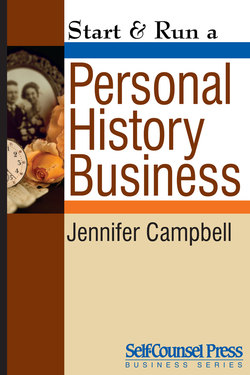Читать книгу Start & Run a Personal History Business - Jennifer Campbell - Страница 38
На сайте Литреса книга снята с продажи.
3. Terms You Should Know
ОглавлениеIn this book, I use “personal history,“ “memoir,” “biography,” and “life story” interchangeably as they all mean an account of one’s life or a segment of that life. They can refer to something written by the person himself or herself, or written by someone else about the person. Here are some definitions of a few terms with which you should be familiar.
• Autobiography: A detailed, factual account of one’s life written by oneself; more likely to be about the person’s entire life; may or may not include reflection, opinions, or feelings.
• Biography: A life story written by someone other than the subject.
• Corporate/Business history: The history of a company, from its roots to present time. May include interviews with employees, leaders, customers, or people living in the community where the business operates.
• Family history: The story of a family that may include several generations and many branches of the family tree. May be a written account, as in a book, with photographs, or a multimedia DVD. May include interviews with one or more family members.
• Genealogist: A person who traces family lineages back through the generations.
• Legacy letter/ethical will: A document, sometimes handwritten and of any length, that expresses what the subject wants his or her loved ones to know: the lessons the subject learned from life; his or her beliefs, values and guiding principles; blessings for loved ones; advice for living a good life … whatever the subject wants to pass on to future generations. See Chapter 15 for more on ethical wills and legacy letters.
• Life story: An account of a person’s life. May include information about ancestors. It can be a blend of events (e.g, In 1965 I joined the firm of … ) as well as reflection (e.g., In retrospect, it probably wasn’t such a good idea … ).
• Life review: Reflecting on the experiences of one’s life. A term coined by a pioneer in the field, Dr. Robert Butler.
• Memoirs: Written reminiscences, stories, or memories about one’s life or a portion of it. A memoir likely includes a good amount of reflection (how the subject remembers events as opposed to factual reenactments, and might be selective memories). There is no obligation to include details like dates, times, places, or names.
• Personal history: The history of a person preserved in a manuscript, book, audio or video CD or DVD, or handwritten format. The medium can vary but the objective is the same: to capture a life story, however the teller wants to tell it.
• Oral history: The audio or video recording of interviews of firsthand accounts of the past, generally preserved for historical importance, and generally including the transcript of the interviews. Before the written word became popular and history was written by the educated or elite groups in society, the oral tradition was the way history was passed down through time. It was revived most notably with the Federal Writers’ Project in the US, in the late 1930s and 1940s, to elicit and save the stories of the diverse working-class population.
• Reminiscence: Remembering past experiences and events.
• Reminiscence Therapy (RT): Discussion of past events and experiences usually with the aid of verbal encouragement, photographs, music, scent, memorabilia, etc. Some studies have shown RT to be beneficial for people with dementia or other memory loss, boosting self-esteem and relieving depression and promoting peace, wholeness, validation, and self-acceptance.
• Social History: Details about what was going on in the world and in everyday life of everyday people, from war to the price of eggs.
